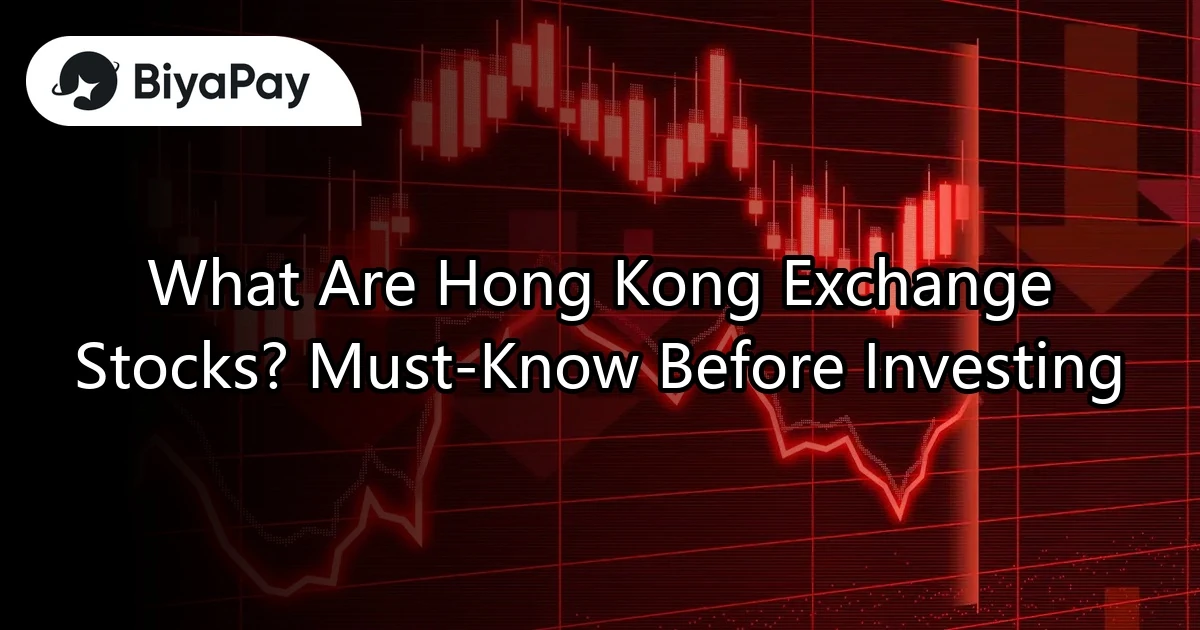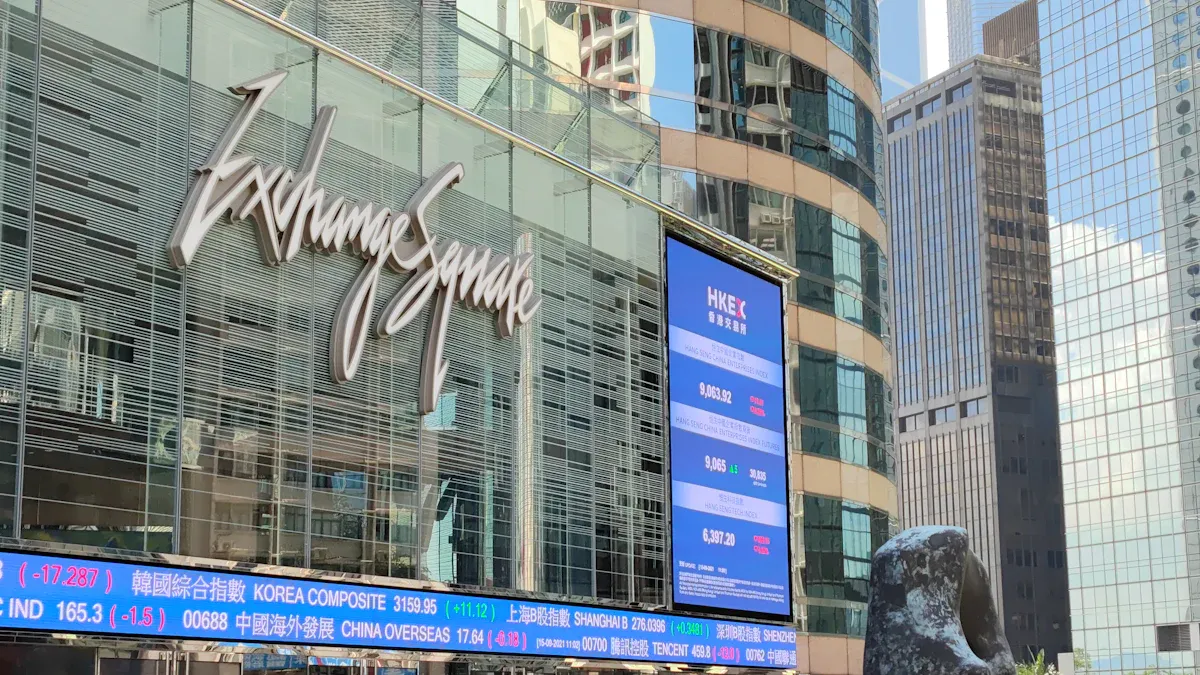- EasyCard
- Trade
- Help
- Announcement
- Academy
- SWIFT Code
- Iban Number
- Referral
- Customer Service
- Blog
- Creator
What Are Hong Kong Exchange Stocks? Must-Know Before Investing

Image Source: pexels
You should understand HKEX stocks before investing. These stocks represent partial ownership in companies listed in Hong Kong. According to the latest data, in the first three quarters of 2024, the average daily turnover of southbound trading through the Stock Connect scheme exceeded USD 4.9 billion (calculated at 1 USD = 7.8 HKD), accounting for 16.9% of the total turnover in the Hong Kong market. HKEX stocks have high trading activity, with transaction volumes accounting for over 80% of the total turnover across the three markets. You need to understand basic information and market rules to better manage risks.
Key Points
- HKEX stocks represent your partial ownership in Hong Kong-listed companies, allowing you to participate in Hong Kong’s economy and international capital markets.
- HKEX stocks come in various types, including stable blue-chip stocks, H-shares of state-owned enterprises, and red-chip stocks registered offshore, catering to different investment goals.
- Before investing, understand the HKEX trading hours, settlement system, and account opening process to ensure smooth transactions.
- Investing in HKEX stocks involves fees such as commissions and stamp duties, and choosing the right platform helps control costs.
- Market and policy risks affect stock performance, and staying informed about market dynamics and diversifying investments can effectively manage risks.
Introduction to HKEX Stocks

Image Source: unsplash
Definition
You can think of HKEX stocks as shares of companies listed on the Hong Kong Stock Exchange. When you buy these stocks, you become a shareholder, owning a portion of the company’s assets and profit distribution rights. Each stock has a unique stock code, making it easy for you to search and trade in the market.
When you invest in HKEX stocks, you are actually participating in the development of Hong Kong’s financial market. These stocks not only represent company ownership but also reflect the vitality of Hong Kong’s economy and the flow of international capital.
Role
HKEX stocks play a significant role in Hong Kong’s financial market. You will find that the Hong Kong Stock Exchange (HKEX) is one of the world’s leading capital markets. According to 2024 data, the number of listed companies on the HKEX exceeds 2,600, covering industries such as finance, real estate, technology, and consumer goods.
You can refer to the table below to understand the main business scope of the HKEX:
| Business Scope | Description |
|---|---|
| Stock Trading | Provides a trading platform for stocks, ETFs, REITs, and other products |
| Derivatives | Includes options, futures, and other derivative instruments |
| Bond Market | Supports bond issuance by corporations and governments |
| International Connectivity | For example, the Stock Connect scheme allows you to invest in Chinese A-shares while attracting international capital to Hong Kong |
When you invest in HKEX stocks, you can also participate in the interconnectivity of global capital markets. The HKEX continuously introduces new policies and products to enhance market competitiveness.
Tip: In 2024, the HKEX’s average daily turnover exceeded USD 4.9 billion (calculated at 1 USD = 7.8 HKD), indicating ample market liquidity, suitable for investors of different scales.
Types
When you invest in HKEX stocks, you will find various types of stocks in the market. Each type has unique characteristics and market positioning. You can choose the appropriate stock type based on your investment goals and risk tolerance.
Blue-Chip Stocks
Blue-chip stocks refer to stocks of large, stable, and highly liquid companies. You will find that the Hang Seng Index includes 34 blue-chip stocks, with their total market capitalization accounting for about 70% of the Hong Kong stock market’s total value. Blue-chip stocks dominate the market, representing the core strength of Hong Kong’s economy.
According to historical data, blue-chip stocks generally perform steadily with lower volatility, making them suitable for those seeking stable long-term returns. These companies mostly come from industries like finance, real estate, and energy, with strong dividend records and operational capabilities.
Tip: The market capitalization and historical performance of blue-chip stocks show that market capital is highly concentrated in these large enterprises. When you invest in blue-chip stocks, you can enjoy higher safety and stable returns.
H-Shares
H-shares refer to stocks of companies registered in mainland China and listed on the Hong Kong Stock Exchange. You will see that H-shares are often large state-owned enterprises or industry leaders.
In recent years, over 150 companies have adopted the “A+H” dual-listing model, reflecting Chinese companies’ active expansion into the Hong Kong market. With policy support, the listing threshold for H-shares has been lowered, attracting more high-quality companies to list in Hong Kong.
The trading volume and market capitalization of H-shares continue to grow, demonstrating their activity and investment appeal in the Hong Kong market. Some H-share companies, such as Kuaishou, show strong growth potential through technological innovation and overseas market expansion.
- Advantages of H-shares include high internationalization, flexible financing, and improved corporate governance.
- The “A+H” model helps companies attract long-term capital to meet global development needs.
Red-Chip Stocks
Red-chip stocks refer to Chinese companies listed in Hong Kong but registered offshore. These companies are mostly controlled by the Chinese government or state-owned enterprises but are registered outside mainland China. When you invest in red-chip stocks, you can participate in China’s economic growth while enjoying the internationalization advantages of the Hong Kong market.
Red-chip stocks typically have high liquidity and growth potential, suitable for those looking to capitalize on China’s economic development opportunities.
Others
In addition to the three main types, HKEX stocks also include the Growth Enterprise Market (GEM Board) and purple-chip stocks. The GEM Board provides listing opportunities for companies with growth potential but not necessarily a profit track record, allowing you to participate in the growth of emerging industries. Purple-chip stocks combine the characteristics of blue-chip and red-chip stocks, with market capitalization and liquidity positioned between the two, offering you more diverse choices.
You can refer to the table below for a quick overview of the market positioning of different types of HKEX stocks:
| Type | Key Characteristics | Market Position (Market Cap Proportion) |
|---|---|---|
| Blue-Chip Stocks | Large, stable, high liquidity | Approx. 70% (Hang Seng Index constituents) |
| H-Shares | China-registered, Hong Kong-listed | Growing trading volume and market cap |
| Red-Chip Stocks | Chinese background, offshore-registered | Internationalized with growth potential |
| GEM Board | Emerging companies, growth potential | Market cap proportion not specified |
| Purple-Chip Stocks | Combines blue-chip and red-chip traits | Unique market positioning |
Note: The Hang Seng Composite Index covers the top 200 listed companies by market capitalization, representing about 97% of the HKEX’s total market value. When choosing different stock types, you should make decisions based on your needs and risk tolerance.
Must-Know Before Investing
Trading Rules
Before investing in HKEX stocks, you must understand the basic trading rules. These rules directly affect your investment experience and risk management capabilities.
Here are key points to note:
- The HKEX trading hours are Monday to Friday, 9:30 AM to 12:00 PM and 1:00 PM to 4:00 PM (Hong Kong time).
- Stock trading follows a T+2 settlement system. After buying stocks, funds and stocks are settled two business days later.
- You can place orders through online trading platforms, mobile apps, or by contacting brokers. Most platforms support real-time quotes and various order types.
- In recent years, the introduction of active ETFs and related system innovations have enhanced market transparency and liquidity. The daily holdings disclosure mechanism and real-time trading framework of active ETFs make it easier for you to track portfolio conditions, improving investment safety.
- According to the 2025 Global ETF Investor Survey, 97% of investors plan to increase allocations to active ETFs, indicating a clear rise in demand for strategic and risk management tools. 53% of respondents said they would shift funds from passive ETFs to active ETFs, reflecting a shift in capital allocation trends.
Tip: Choosing active ETFs allows you to enjoy higher transparency and strategic flexibility, helping to enhance investment safety and market stability.
Account Opening Process
To trade HKEX stocks, you first need to open a securities account with a Hong Kong bank or brokerage. The account opening process generally includes the following steps:
- Prepare identification documents (e.g., Hong Kong ID or passport) and proof of address (e.g., bank statements or utility bills).
- Complete the account opening application form and sign relevant agreements.
- Some platforms may require in-person or video verification to confirm identity.
- After submitting documents, the brokerage or bank will conduct a review.
According to 2023 data, the account opening process typically takes 3 to 7 business days to complete. The review speed may vary slightly across platforms, but in most cases, you can complete the account opening and start investing in HKEX stocks within a week.
Main Fees
When investing in HKEX stocks, you will encounter various fees. These fees affect your actual returns. You should carefully compare the fee structures of different platforms. Common fees include:
| Fee Type | Description |
|---|---|
| Commission | Transaction fees charged by brokers or online platforms, usually a percentage of the transaction amount. |
| Government Taxes | Includes stamp duty (0.13% of transaction amount), transaction levies, and trading system fees. |
| Platform Service Fees | Some platforms charge monthly or annual fees or have minimum consumption requirements. |
| Third-Party Payment Fees | For example, using PayPal or other third-party payment platforms incurs fees of about 2.9% plus a fixed fee (in USD). |
| Fund Deposit/Withdrawal Fees | Banks or platforms may charge fees for withdrawals or deposits. |
You will find that the fee structures and pricing models of different platforms adjust based on market demand. Some platforms may have hidden costs or additional service fees. You should carefully review the terms before opening an account to choose the most suitable investment platform.
Risks
When investing in HKEX stocks, you must recognize market and policy risks. These risks affect your capital safety and returns. You can refer to the following points:
- Changes in geopolitical relations affect market sentiment. Recently, geopolitical tensions have eased, and HKEX blue-chip stocks have performed strongly, but you should continue to monitor policy support levels.
- Chinese policy adjustments (e.g., rare earth export controls) drive price fluctuations in related concept stocks, increasing policy risk uncertainty.
- Some constituent stocks show divergent performance, with some declining, reflecting market volatility and instability factors.
- International financial market fluctuations (e.g., USD index or gold price movements) affect the Hong Kong stock investment environment.
- The Hang Seng Index price is influenced by multiple factors, including large-cap blue-chip stock prices, Hong Kong’s local economic data, China’s economic conditions, international financial markets, HKD interest rates, index adjustments, and investor sentiment.
Note: You should closely monitor market news and policy developments, conduct risk assessments, and allocate assets wisely to avoid significant losses due to market fluctuations.
Market Position

Image Source: unsplash
International Influence
You can see that HKEX stocks hold a pivotal position in global capital markets. The Hong Kong Stock Exchange connects China with international markets, allowing you to participate in both USD and RMB systems simultaneously.
- HKEX stocks are affected by US-China trade negotiations, making market sentiment prone to fluctuations. Technology stocks sometimes lag behind the broader market, but bank stocks can occasionally rise against the trend.
- Different industry sectors show divergent performance; defense and semiconductor sectors may decline, but newly listed companies often see significant first-day price surges, indicating market vitality.
- Morgan Stanley raised its target price for the HKEX due to its strong IPO performance, expecting daily trading volumes in 2025 and 2026 to remain high, reflecting international investors’ confidence in the HKEX stock market.
- The Hong Kong SAR government maintains the HKD’s peg to the USD and actively develops Hong Kong as a global offshore RMB business hub, further strengthening the HKEX’s interaction with major global markets.
Tip: When you invest in HKEX stocks, you are participating in global capital flows, seizing diverse opportunities in international markets.
Latest Developments
You need to closely monitor market trends and policy changes, as these factors directly impact your investment decisions. Recently, the economic policy uncertainty index has risen significantly, and geopolitical risks persist. US government debt issues, credit rating changes, and trade policy adjustments increase market uncertainty. These policy changes affect investor confidence in capital markets, intensifying market volatility.
You can understand changes in market demand through year-on-year sales data comparisons. Year-on-year growth rates reveal consumer behavior and market trends. Government policies, exchange rate fluctuations, and international political factors affect sales data, reflecting the true state of the market. Companies adjust product portfolios and pricing strategies based on these data, strengthening customer relationship management, promoting digital marketing, and expanding into new markets.
Aggressive tariff measures sometimes trigger market panic selling, intensifying short-term volatility. As an investor, you should assess policy impacts, maintain capital flexibility, and wait for clarity in international trade dynamics. These phenomena show that policy changes genuinely reflect and influence market conditions, requiring companies and investors to adapt strategies flexibly.
When investing in HKEX stocks, you should first understand their types, market rules, and potential risks. You need to conduct thorough research and analyze company fundamentals. It is recommended to regularly monitor market dynamics and adjust investment strategies flexibly. Rational investing helps you reduce losses and improve returns.
Tip: Conduct a risk assessment before investing to better manage your capital.
FAQ
What are “blue-chip stocks” in HKEX?
Blue-chip stocks refer to stocks of large, stable companies. When you invest in blue-chip stocks, you typically achieve stable returns. These stocks have high liquidity and lower risk.
How to open an HKEX stock trading account?
You can bring identification documents and proof of address to a Hong Kong bank or brokerage to apply. It generally takes 3 to 7 business days to complete the account opening, after which you can start trading.
What are the main fees for investing in HKEX stocks?
You need to pay commissions, stamp duty (0.13%), transaction levies, etc. Calculated at 1 USD = 7.8 HKD, fees are based on the transaction amount converted to USD.
What are the trading hours for HKEX stocks?
You can trade from Monday to Friday, 9:30 AM to 12:00 PM and 1:00 PM to 4:00 PM (Hong Kong time). The market is closed on public holidays.
What are the risks of investing in HKEX stocks?
You face market volatility, policy changes, and international financial environment impacts. It is recommended to diversify investments and regularly review your portfolio to reduce potential loss risks.
Navigating the dynamic Hong Kong Exchange stock market in 2025 requires agility, but high transaction fees and complex cross-border fund management often erode returns. BiyaPay offers a seamless solution to these challenges. With a quick mobile app registration, you can open an account without cumbersome procedures and trade U.S. and Hong Kong stocks in real-time using a single account—start now at BiyaPay!
BiyaPay supports real-time conversions across multiple fiat and digital currencies with transparent rate queries, keeping costs clear. With remittance fees as low as 0.5%, it outperforms traditional platforms. Visit BiyaPay today to streamline your investments and seize opportunities in the HKEX market!
*This article is provided for general information purposes and does not constitute legal, tax or other professional advice from BiyaPay or its subsidiaries and its affiliates, and it is not intended as a substitute for obtaining advice from a financial advisor or any other professional.
We make no representations, warranties or warranties, express or implied, as to the accuracy, completeness or timeliness of the contents of this publication.




Contact Us
Company and Team
BiyaPay Products
Customer Services
is a broker-dealer registered with the U.S. Securities and Exchange Commission (SEC) (No.: 802-127417), member of the Financial Industry Regulatory Authority (FINRA) (CRD: 325027), member of the Securities Investor Protection Corporation (SIPC), and regulated by FINRA and SEC.
registered with the US Financial Crimes Enforcement Network (FinCEN), as a Money Services Business (MSB), registration number: 31000218637349, and regulated by FinCEN.
registered as Financial Service Provider (FSP number: FSP1007221) in New Zealand, and is a member of the Financial Dispute Resolution Scheme, a New Zealand independent dispute resolution service provider.



















